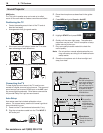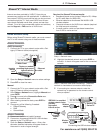
3. TV Features 17
For assistance call 1(800) 332-2119
3D Video, continued
3D Safety Requirements
3D Glasses are NOT designed as sunglasses or safety glasses and do not provide protection. 3D glasses should •
be worn only when viewing 3D material.
Do not wear the wireless glasses in any situations that require unimpaired visual perception.•
Children under the age of 5 should not view 3D programming.•
Under normal conditions, 3D viewing is safe for your movies or games. Some people may experience discomfort,
however. To minimize the potential for experiencing visual problems or any adverse symptoms:
Read and follow any and all safety warnings that accompany your 3D glasses or 3D source devices.•
Maintain a distance of no less than 2 to 2.5 feet away from the display. Viewing from too short a distance can •
strain your eyes.
Take regular breaks, at least 5 minutes after every hour of 3D viewing.•
If you experience any of the following symptoms, discontinue 3D viewing until the symptoms go away:
nausea, dizziness, or queasiness, •
headache, or eyestrain, •
blurry vision,•
double vision that lasts longer than a few seconds,•
Do not engage in any potentially hazardous activity (for example, driving a vehicle) until your symptoms have com-
pletely gone away. If symptoms persist, discontinue use and do not resume 3D viewing without discussing your
symptoms with a physician.
Epilepsy
WARNING!
IF YOU OR ANY MEMBER OF YOUR FAMILY HAS A HISTORY OF EPILEPSY, CONSULT A PHYSICIAN BEFORE
USING COMPUTER GAME PRODUCTS.
A small percentage of the population may experience epileptic seizures when viewing certain types of TV images or
video games that contain flashing patterns of light.
The following people should consult a physician before viewing 3D Games or Video:
Anyone with a history of epilepsy, or who has a family member with a history of epilepsy•
Anyone who has ever experienced epileptic seizures or sensory disturbances triggered by flashing light effects.•
WARNING!
SOME LIGHT PATTERNS MAY INDUCE SEIZURES IN PERSONS WITH NO PRIOR HISTORY OF EPILEPSY.
DISCONTINUE 3D VIEWING IF YOU EXPERIENCE ANY OF THE FOLLOWING SYMPTOMS:
Involuntary movements, eye or muscle twitching•
Muscle cramps•
Nausea, dizziness, or queasiness•
Convulsions•
Disorientation, confusion, or loss of awareness of your surroundings•
Do not engage in any potentially hazardous activity (for example, driving a vehicle) until your symptoms have com-
pletely gone away.
Do not resume 3D viewing without discussing the symptoms with your physician.


















